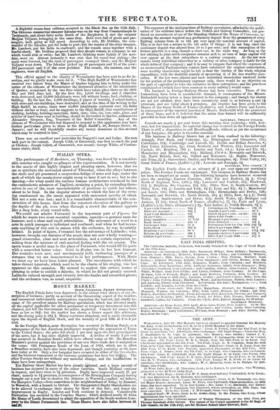ITALIAN OPERA.
The performance of Ii Barbiere, on Thursday, was heard by a consider- able number who caught no glimpse of the representation. It is not merely to the music of this highly elegant and pleasing opera, however, that we am to attribute the unwonted crowd of Thursday, when the alleys between the stalls-and pit presented a suspension-bridge of arms and legs, under the each of which the musie-lover might creep to hear if not to see; but to the dancing,--for what maid the curious human architecture overhead he but thmenthusiastic admiroreof Tsglioni, straining a point, by extendiogthem- selves in one of the most uncomfortable of positions to catch her adieus, about to be final. In the singular situation to -which the fate of the oven- log condemned us, the music appeared with unwonted novelty of effect. But not a note was lest; and it is a remarkable characteristic of the con- struction of this house, that from the remotest elevation of the gallery to the depths of the pit, even when through a crowd the entrance appears like a deep hole, every sound tells. We could not admire Fornasari in the important part of Figaro; for which he wants two most essential requisites, namely—a genuine taste for humour, and a clear and rapid articulation. His utterance of a word to a note in quick passages is indistinct and confused; and when he had to exe- crate anything of this sort in unison with the orchestra, he was invariably behind. In point of figure, Fornasari has the advantage of Lablaclae; who, however, brought out features of the music that are now wholly wanting,— grand crescendos, clear and neat articulation, and a certain expression re- sulting from the mixture of real musical feeling with the cis cornice. The opera wants a useful man in the place of Fornasari, who would fill his parts with a somewhat better voice. Grim in Rosetta was in her best humour. Her roulades were new, and uncommonly bold, embracing passages of a compass that- we are unaccustomed to in her performance. 'With Mario we must say we have been better pleased. The smoothness with which he takes distant intervals, which used to be the charm of his singing, was less apparent on this occasion. He seemed to neglect this certain means of pleasing in order to exhibit a falsetto, in which he did not greatly succeed. Lablache infused strength and vivacity into the finales and concerted pieces; and the orchestra was, as usual, exquisite.


























 Previous page
Previous page